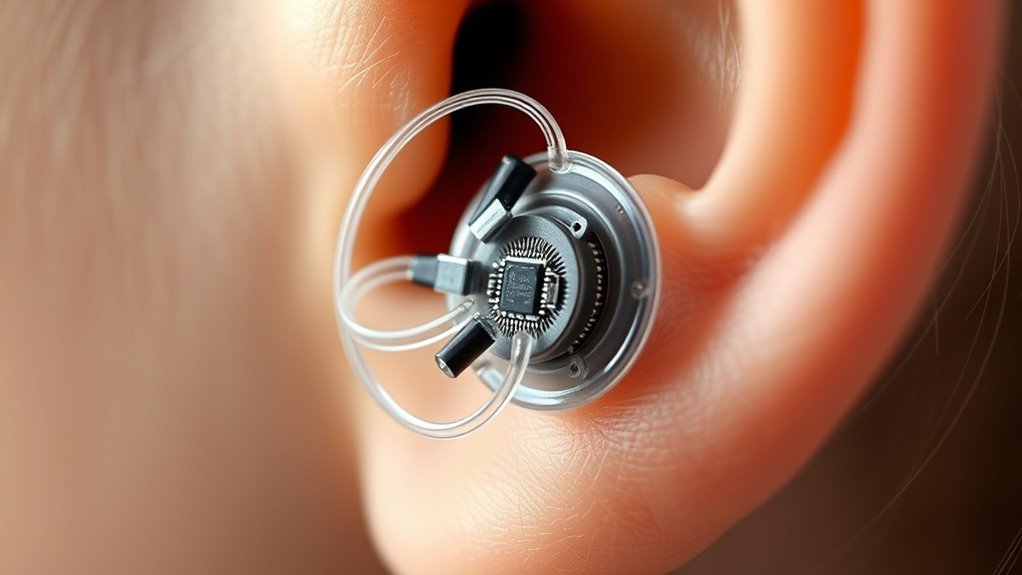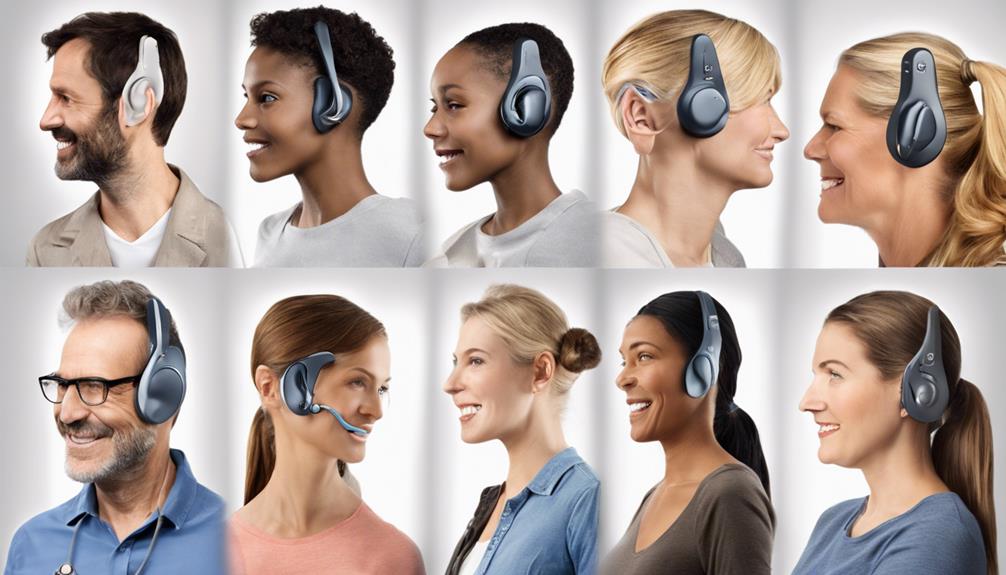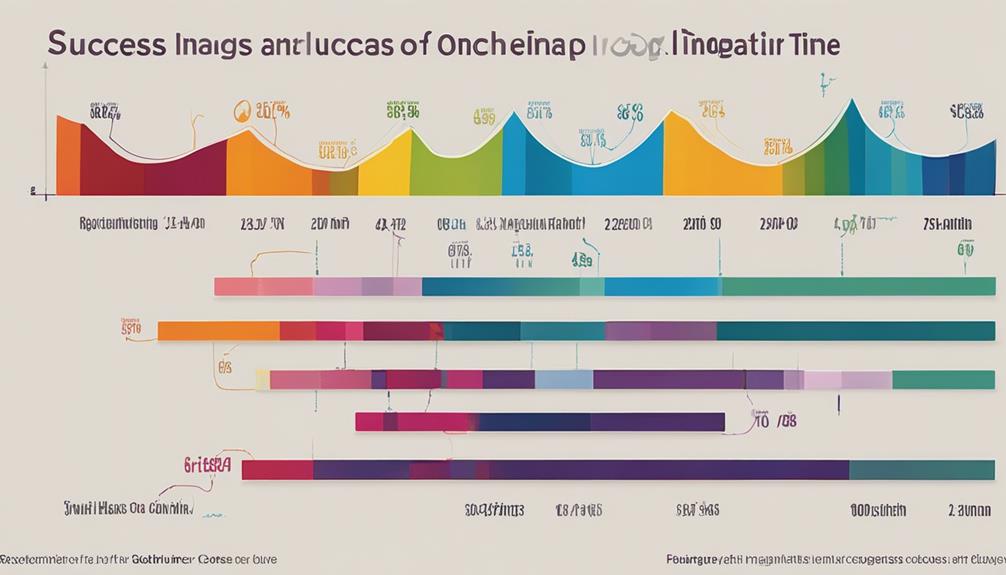The future of fully implantable cochlear devices looks promising, with innovations improving sound quality, personalization, and durability. Advances in biocompatible materials and miniaturization make devices more reliable and longer-lasting, while smarter algorithms enhance hearing clarity and user experience. Power management, wireless connectivity, and data security continue to evolve, ensuring safety and convenience. As development progresses through rigorous clinical testing and ethical considerations, you’ll discover how these innovations could transform hearing solutions for many.
Key Takeaways
- Advances in biocompatible materials and miniaturization will enhance device durability and long-term safety.
- Integration of AI-driven signal processing will improve sound clarity, personalization, and adaptive performance.
- Power management innovations, including wireless charging and energy harvesting, will extend device autonomy.
- Rigorous clinical testing and regulatory approval will ensure safety, efficacy, and ethical deployment of future devices.
- Enhanced data security and privacy measures will protect user information, fostering trust and responsible use.
Technological Innovations Driving Progress
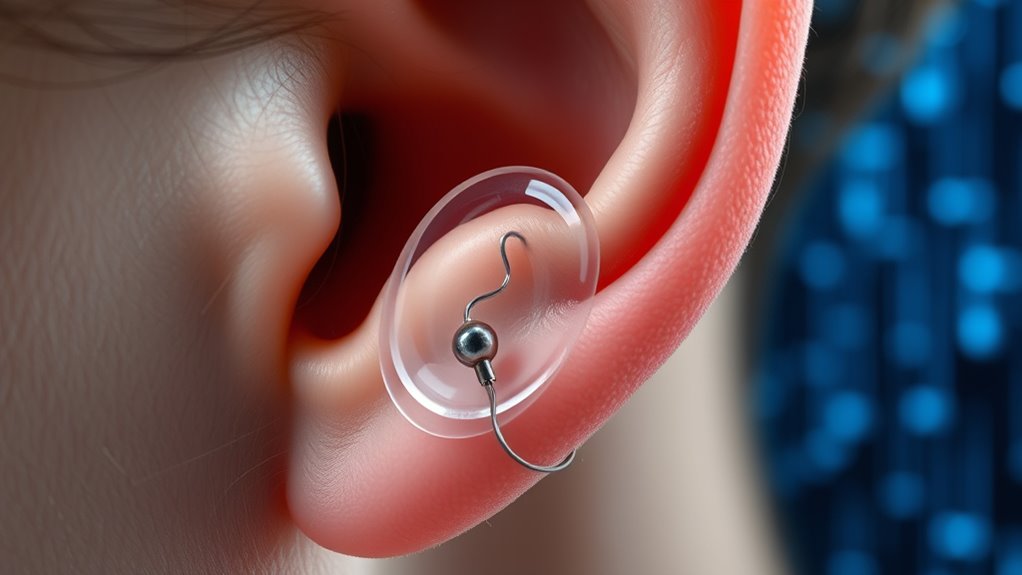
Advancements in microelectronics and biocompatible materials are fueling the development of fully implantable cochlear devices. These innovations enable seamless integration with your nervous system, leveraging brain computer interfaces to interpret neural signals directly. By improving material biocompatibility, developers reduce immune responses and tissue damage, ensuring longer-lasting, more reliable implants. Microelectronics miniaturize components, allowing complex processing within a tiny package that’s fully implantable. This progress helps create devices that communicate effortlessly with your brain, improving sound perception without external hardware. As researchers refine these technologies, expect more natural hearing experiences and increased durability, making cochlear implants more effective and less intrusive. Additionally, understanding the importance of contrast ratio in visual systems highlights the significance of detailed information for optimal device performance. These breakthroughs are vital for transforming cochlear devices into fully integrated solutions that work harmoniously with your body.
Enhancing Sound Quality and User Experience

To truly improve how fully implantable cochlear devices serve you, developers are focusing on enhancing sound quality and user experience. They’re refining auditory perception by optimizing signal processing algorithms, which deliver clearer and more natural sounds. This allows you to better distinguish speech, music, and environmental noises. Additionally, user customization features are becoming more advanced, letting you tailor settings to your unique hearing preferences and environments. These adjustments can be made seamlessly through intuitive interfaces, ensuring your device adapts to different situations effortlessly. By prioritizing both sound quality and personalized controls, the technology aims to create a more satisfying, comfortable experience. The goal is to make hearing more natural and less intrusive, so you can engage confidently in all aspects of daily life. Incorporating high-quality components is essential for achieving these improvements and ensuring durability over time.
Battery Life and Power Management Solutions
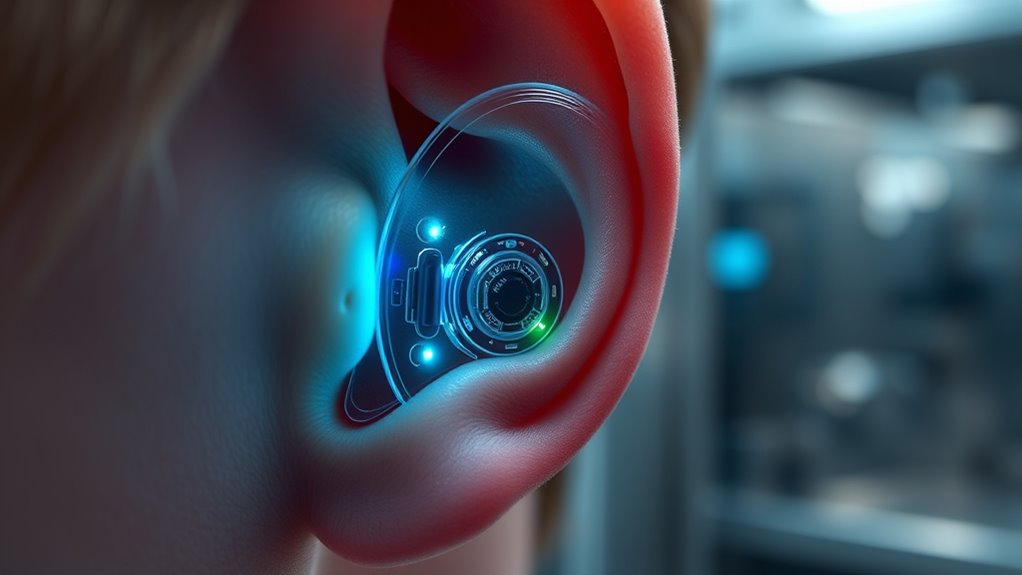
As fully implantable cochlear devices become more sophisticated, optimizing battery life and power management is essential to guarantee reliable performance throughout your day. Advances focus on increasing energy efficiency and integrating power harvesting techniques, reducing the need for frequent recharging or battery replacements. Innovative solutions include energy-efficient processors and low-power components that extend device operation. Power harvesting methods, like capturing energy from body movements or heat, further enhance battery longevity. The table below illustrates key aspects:
| Aspect | Current Technologies | Future Potential |
|---|---|---|
| Energy Efficiency | Low-power processors, optimized circuits | Adaptive power management |
| Power Harvesting | Body heat, movement energy | Continuous, seamless supply |
| Battery Technology | Lithium-ion, solid-state batteries | Longer-lasting, safer |
| Recharging Methods | Wireless charging | Self-charging solutions |
| Power Management | Smart algorithms, minimal energy waste | Autonomous energy use |
Additionally, ongoing research into biocompatible materials aims to improve device longevity and user safety.
Wireless Connectivity and Data Transmission
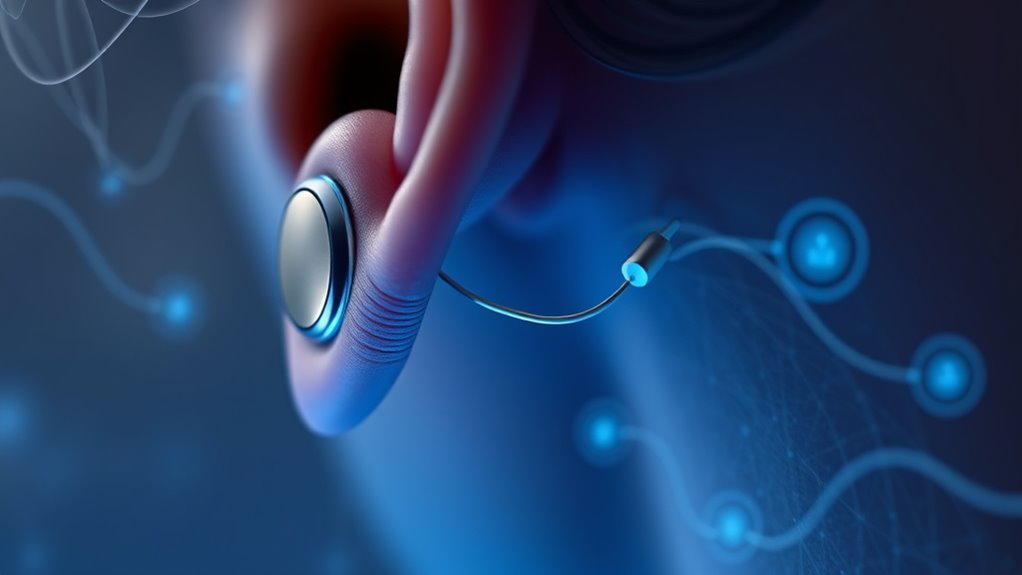
Wireless connectivity and data transmission are crucial for fully implantable cochlear devices, enabling seamless communication between the implant and external processors. Advanced wireless protocols ensure reliable, real-time data transfer, minimizing latency and interruptions. These protocols must be optimized for low power consumption to preserve battery life, while maintaining high security standards. Data encryption plays an essential role in protecting sensitive user information from breaches during transmission. Secure wireless links guarantee that your personal hearing data remains private and safe from unauthorized access. As technology advances, you’ll benefit from faster, more stable connections that enhance device performance and user experience. Additionally, ongoing innovations in machine learning algorithms can enhance adaptive sound processing, making hearing experiences more natural and personalized. Overall, robust wireless connectivity and secure data transmission are fundamental for the next generation of fully implantable cochlear devices, ensuring safety, reliability, and convenience.
Clinical Trials and Regulatory Approvals

Have you ever wondered what it takes to bring fully implantable cochlear devices from the lab to your ears? It involves rigorous clinical trials focused on patient selection and trial design. You’ll see trial protocols carefully crafted to evaluate safety, efficacy, and durability. Key steps include:
Bringing fully implantable cochlear devices to market requires rigorous clinical trials and regulatory approval processes.
- Selecting appropriate patient populations based on hearing profiles
- Designing trials that compare new devices with existing standards
- Ensuring compliance with regulatory standards
- Collecting comprehensive safety and performance data
- Charting approval processes from agencies like the FDA and EMA
- Understanding the importance of trial design in ensuring accurate and reliable results.
These stages ensure the devices meet strict safety and effectiveness criteria before reaching the market. Regulatory approvals depend heavily on well-structured clinical trials, making this process essential to bring innovative solutions to those who need them most.
Future Challenges and Ethical Considerations
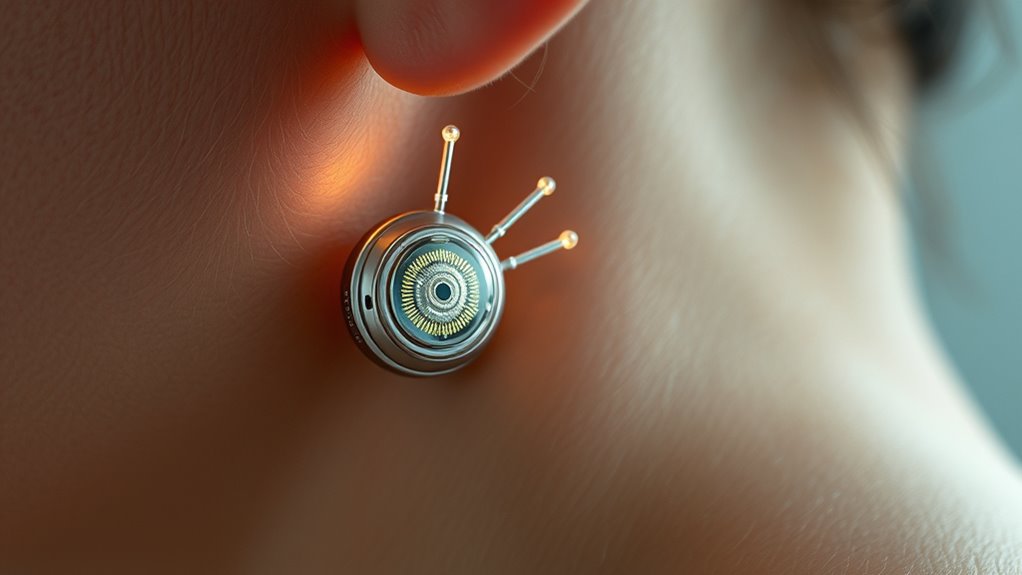
As you consider the future of fully implantable cochlear devices, you need to think about privacy and data security risks. Long-term device durability also presents challenges for sustained performance and user safety. Additionally, ethical concerns around implantation procedures and access must be addressed to guarantee responsible development. Recognizing emotional support needs for users and their families is also essential to ensure holistic care and acceptance.
Privacy and Data Security
While fully implantable cochlear devices promise remarkable advancements in hearing restoration, they also raise significant privacy and data security concerns. Your device collects sensitive auditory data, making strong data encryption essential to protect it from breaches. Maintaining user anonymity is critical to prevent misuse or tracking of your personal information. Without proper safeguards, your hearing data could be accessed or manipulated by malicious actors. Key challenges include:
- Ensuring secure data transmission
- Protecting against hacking attempts
- Preserving user anonymity
- Implementing robust encryption protocols
- Managing consent for data collection
Additionally, integrating privacy-preserving techniques into device design can help mitigate risks associated with data collection and storage. Addressing these issues is crucial to safeguard your privacy while enjoying the benefits of advanced cochlear technology. Future solutions must prioritize security to build trust and ensure ethical use of your personal data.
Long-term Device Durability
Maintaining the long-term functionality of fully implantable cochlear devices presents significant technical and ethical challenges. Biocompatibility challenges arise because the device must coexist with body tissues without causing adverse reactions, which can affect durability. Material longevity is imperative, as components need to withstand years of use without degradation, corrosion, or failure. You must consider how materials interact with the body’s environment, guaranteeing they remain stable and safe over time. Advances in biocompatible materials can help extend device lifespan, but ongoing testing is crucial to prevent complications. Addressing these durability issues is essential to assure users benefit from reliable, long-lasting devices, minimizing the need for replacements or repairs that could pose additional ethical concerns. Material compatibility plays a vital role in ensuring the device’s long-term success and safety.
Ethical Implantation Concerns
Implementing fully implantable cochlear devices raises critical ethical concerns that must be addressed before widespread adoption. You need to ensure that patients provide informed consent, understanding risks, benefits, and limitations. Ethical oversight is essential to prevent misuse or unintended consequences. Key concerns include:
- Making certain patients fully comprehend the procedure and implications
- Protecting patient autonomy and decision-making rights
- Addressing potential long-term health or privacy risks
- Managing the societal impact of enhanced sensory capabilities
- Guaranteeing equitable access across different populations
- Considering the technology’s limitations and realistic expectations for outcomes
As you consider these challenges, prioritizing transparency, ongoing ethical review, and patient education will be vital for responsible integration of this technology. Balancing innovation with ethical responsibility ensures the benefits outweigh potential harms.
Frequently Asked Questions
What Are the Cost Implications of Future Fully Implantable Cochlear Devices?
You’re wondering about the cost implications of fully implantable cochlear devices. As technology advances, manufacturers aim for cost reduction, making these devices more affordable. Insurance coverage may expand as the benefits become clearer, helping more users access these innovations. While initial costs might be high, future developments could lower expenses, making fully implantable cochlear devices a more accessible solution for those with hearing loss.
How Will These Devices Be Personalized for Individual Hearing Needs?
You’ll find that future fully implantable cochlear devices will be highly personalized for your hearing needs. Personalization algorithms will analyze your unique hearing profile, allowing the device to adapt precisely to your environment. Customizable fittings will ensure comfort and peak performance. This tailored approach means you’ll enjoy clearer sound quality, better speech recognition, and a more natural hearing experience, all designed specifically for your auditory preferences and lifestyle.
What Training Will Audiologists Require for New Implant Technologies?
Imagine your skills as a key releasing new worlds of sound. To do so, you’ll need specialized audiologist certification and surgical training that keep you at the forefront of technology. As devices become more advanced, your expertise will grow like a garden in full bloom, enabling you to expertly fit and troubleshoot these innovations. Staying current guarantees you can confidently guide patients through their auditory journey, transforming lives one sound at a time.
How Will Future Devices Address Compatibility With Other Medical Implants?
You’ll face interoperability challenges as future devices need to seamlessly work with other medical implants. Manufacturers will have to navigate regulatory hurdles to guarantee safety and compatibility. You might see standards evolve to address these issues, making it easier for your devices to communicate effectively. Staying informed about new regulations and technological advances will help you adapt as these innovations improve integration and patient outcomes.
What Long-Term Maintenance and Support Will Be Available for Users?
Ever wonder if your cochlear device will outlast your favorite smartphone? Well, you’ll benefit from long-term support like remote monitoring, so your device stays in top shape without constant visits. Expect easy upgrades to keep up with tech advances, ensuring you’re never left behind. With ongoing support, maintenance becomes seamless, and you can focus on living your best life—without fretting over your implant’s longevity.
Conclusion
As you explore the future of fully implantable cochlear devices, remember that innovation never stands still. With ongoing advancements, improved sound quality, and seamless connectivity, these devices promise a better quality of life. However, challenges like power management and ethical concerns remain. As the saying goes, “The journey of a thousand miles begins with a single step.” Embrace the progress, knowing that each step brings you closer to transforming lives through cutting-edge technology.

